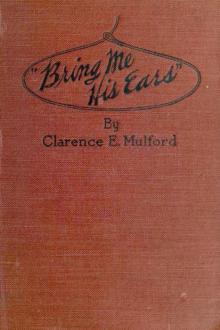Ride Proud, Rebel!, Andre Norton [reading books for 5 year olds TXT] 📗

- Author: Andre Norton
Book online «Ride Proud, Rebel!, Andre Norton [reading books for 5 year olds TXT] 📗». Author Andre Norton
Perhaps what I say may be of value since I have always held your welfare dear to me, and you have a place in my heart. Melanie Mattock Rennie was my dearest friend for all of her life, your father, my cousin. And you were Sheldon's playmate and comrade for his short time on this earth.
Come home to us, I ask you to do this, my dear boy. We shall welcome you.
I pray for you and for Boyd, that you may both be brought safely through all the dangers which surround a soldier, that you may come home to us on a happier day. Your concern for and care of Boyd is something which makes me most grateful and happy. He had lost a brother, one of his own blood, but I content myself with the belief that he has with him now another who will provide him with what guidance and protection he can give.
Remember—we want you both here with us once more, and let it be soon.
With affection and love,
Drew could not have told whether her "Meredith Barrett" at the bottom of the page was as firmly penned as ever. To him it was now wavering from one misty letter to the next. Slowly he made a business of folding the sheet into a neat square of paper which he could fit into the safe pocket under his belt. A crack was forming in the shell he had started to grow on the night he first rode out of Red Springs, and he now feared losing its protection. He wanted to be the Drew Rennie who had no ties anywhere, least of all in Kentucky. Yet not for the world would he have lost that letter, though he did not want to read it again.
"Rennie! Double-quick it; the General's askin' for you!"
Boyd started up eagerly from his perch on another saddle. He was, Drew decided, like a hound puppy, so determined to be taken hunting that he watched each and every one of them all the time. He had been allowed to ride on this return visit to West Tennessee with the condition that he would act as one of Drew's scout couriers, a position which kept him under his elder's control and attached to General Buford's Headquarters Company.
Kirby reached out a brown hand to catch Boyd by the sleeve and anchor him.
"Now, kid, jus' because the big chief sends for him, it ain't no sign he's goin' to take the warpath immediately, if not sooner. Ease off, an' keep your moccasins greased!"
Drew laughed. Nobody who rode with Forrest could complain of a lack of action. He had heard that some general in the East had said he would give a dollar or some such to see a dead cavalryman. Well, there had been sight of those at Harrisburg and some at the blockhouses. Forrest stated that Morgan's men could fight; he did not have to say that of his own.
Now they were heading into another sort of war altogether. Drew hadn't figured out just how Bedford Forrest intended to fight river gunboats with horse soldiers, but the scout didn't doubt that his general had a plan, one which would work, barring any extra bad luck.
They were setting a trap along the Tennessee right now, lying in the enemies' own back pasture to do it. South, downriver, was Johnsonville, where Sherman had his largest cache of supplies, from which he was feeding, clothing, equipping the army now slashing through the center of the South. They had been able to cripple his rail system partially on that raid two weeks earlier; now they were aiming to cut the river ribbon of the Yankee network.
Buford's division occupied Fort Heiman, well above the crucial section. The Confederates also held Paris Landing. Now they were set to put the squeeze on any river traffic. Guns were brought into station—Buford's two Parrots, one section of Morton's incomparable battery with Bell's Tennesseeans down at the Landing. They had moved fast, covered their traces, and Drew himself could testify that the Yankees were as yet unsuspecting of their presence in the neighborhood.
He found General Buford now and reported.
"Rennie, see this bend...." The General's finger stabbed down on the sketch map the scouts had prepared days earlier. "I've been thinkin' that a vedette posted right here could give us perhaps a few minutes of warning ahead when anything started to swim into this fishnet of ours. General Forrest wants some transports, maybe even a gunboat or two. We're in a good position to deliver them to him, but before we begin the game, I want most of the aces right here—" He smacked the map against the flat of his other palm.
"A signal system, suh. Say one of those—" Drew pointed to the very large and very red handkerchief trailing from Buford's coat pocket. "Wave one of those out of the bushes: one wave for a transport, two for a gunboat."
The General jerked the big square from his pocket, inspected it critically, and then called over his shoulder.
"Jasper, you get me another one of these—out of the saddlebags!"
When the Negro boy came running with the piece of brilliant cloth, Buford motioned for him to give it to Drew.
"Mind you, boy," he added with some seriousness, "I want that back in good condition when you report in. Those don't grow handily on trees. I have only three left."
"Yes, suh," Drew accepted it with respect. "I'm to stay put until relieved, suh?"
"Yes. Better take someone to spell you. I don't want any misses."
Back at the scout fire Drew collected Boyd. This was an assignment the boy could share. And shortly they had hollowed out for themselves a small circular space in the thicket, with two carefully prepared windows, one on the river, the other for their signal flag.
It was almost evening, and Drew did not expect any night travel. Morning would be the best time. He divided the night into watches, however, and insisted they keep watch faithfully.
"Kinda cold," Boyd said, pulling his blanket about his shoulders.
"No fire here." Drew handed over his companion's share of rations, some cold corn bread and bacon carefully portioned out of their midday cooking.
"'Member how Mam Gusta used to make us those dough geese? Coffee-berry eyes.... I could do with some coffee berries now, but not to make eyes for geese!"
Dough geese with coffee-berry eyes! The big summer kitchen at Oak Hill and the small, energetic, and very dark skinned woman who ruled it with a cooking spoon of wood for her scepter and abject obedience from all who came into her sphere of influence and control. Dough geese with coffee-berry eyes; Drew hadn't thought of those for years and years.
"I could do with some of Mam Gusta's peach pie." He was betrayed by memory into that wistfulness.
"Peach pie all hot in a bowl with cream to top it," Boyd added reverently. "And turkey with the fixin's—or maybe young pork! Seems to me you think an awful lot about eatin' when you're in the army. I can remember the kitchen at home almost better than I can my own room...."
"Anse, he was talkin' last night about some Mexican eatin' he did down 'long the border. Made it sound mighty interestin'. Drew, after this war is over and we've licked the Yankees good and proper, why don't we go down that way and see Texas? I'd like to get me one of those wild horses like those Anse's father was catchin'."
"We still have a war on our hands here," Drew reminded him. But the thought of Texas could not easily be dug out of mind, not when a man had carried it with him for most of his life. Texas, where he had almost been born, Hunt Rennie's Texas. What was it like? A big wild land, an outlaws' land. Didn't they say a man had "gone to Texas" when the sheriff closed books on a fugitive? Yes, Drew had to admit he wanted to see Texas.
"Drew, you have any kinfolk in Texas?"
"Not that I know about." Not for the first time he wondered about that. There had been no use asking any questions of his grandfather or of Uncle Murray. And Aunt Marianna had always dismissed his inquiries with the plea that she herself had only been a child at the time Hunt Rennie came to Red Springs and knew very little about him. Odd that Cousin Merry had been so reticent, too. But Drew had pieced out that something big and ugly must have happened to begin all the painful tangle which had led from his grandfather's cold hatred for Hunt Rennie, that hatred which had been transferred to Hunt Rennie's son when the original target was gone.
When Drew first joined the army and met Texans he had hoped that one of them might recognize his name and say:
"Rennie? You any kin to the Rennies of-" Of where? The Brazos, the Rio country, West Texas? He had no idea in which part of that sprawling republic-become-a-state the Rennies might have been born and bred. But how he had longed in those first lonely weeks of learning to be a soldier to find one of his own—not of the Mattock clan!
"Yes, I would like to see Texas!" Boyd pulled the blanket closer about his shoulders, curling up on his side of their bush-walled hole. "Wish these fool Yankees would know when they're licked and get back home so we could do somethin' like that." He closed his eyes with a child's determination to sleep, and by now a soldier's ability to do so when the opportunity offered.
Drew watched the river. The dusk was night now with the speed of the season. And the crisp of autumn hung over the water. This was the twenty-ninth of October; he counted out the dates. How long they could hold their trap they didn't know, but at least long enough to wrest from the enemy some of the supplies they needed far worse than Sherman's men did.
General Buford had let four transports past their masked batteries today because they had carried only soldiers. But sooner or later a loaded ship was going to come up. And when that did—Drew's hand assured him that the General's red handkerchief was still inside against his ribs where he had put it for safekeeping.
In the early morning Drew slipped down to the river's edge behind a screen of willow to dip the cold water over his head and shoulders—an effective way to clear the head and banish the last trace of sleep.
The sun was up and it must have been shortly before eight when they sighted her, a Union transport riding low in the water, towing two barges. A quick inspection through the binoculars he had borrowed from Wilkins told Drew that this was what the General wanted. He passed the signal to Boyd.
"Mazeppa," he read the name aloud as the ship wallowed by their post. She was passing the lower battery now, and there was no sign of any gunboat escort. But when their quarry was well in the stretch between the two lower batteries, they opened fire on her, accurately enough to send every shell through the ship. The pilot headed her for the opposite shore, slammed the prow into the bank, and a stream of crew and men leaped over at a dead run to hunt shelter in the woods beyond.
Men were already down on the Confederate-held side of the river, trying to knock together a raft on which to reach their prize. When that broke apart Drew and Boyd saw one man seize upon a piece of the wreckage and kick his way vigorously into the current heading for the stern of the grounded steamer. He came back in the Mazeppa's yawl with a line, and she was warped back into the hands of the waiting raiders.
There was a wave of gray pouring into the ship, returning with bales, boxes, bundles. Then Drew, who had snatched peeps at the activity between searching the upper waters for trouble, saw the gunboats coming—three of them. Again Boyd signaled, but the naval craft made better speed than the laden transport and they were already in position to lob shells among the men unloading the supply ships, though the batteries on the shore finally drove them off.
In the end they fired the prize, but she was emptied of her rich cargo. Shoes, blankets, clothing—you didn't care whether breeches and coats were gray or blue when they replaced rags—food.
Kirby came to their sentry post, his arms full, a beatific smile on his face.
"What'll you have, amigos—pickles, pears, Yankee crackers, long sweetenin'—" He spread out a variety of such stores as they had almost forgotten existed. "You know, seein' some of the prices on this heah sutlers' stuff, I'm thinkin' somebody's sure gittin' rich on





Comments (0)